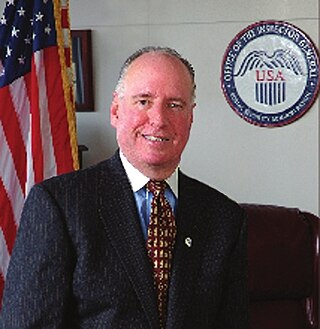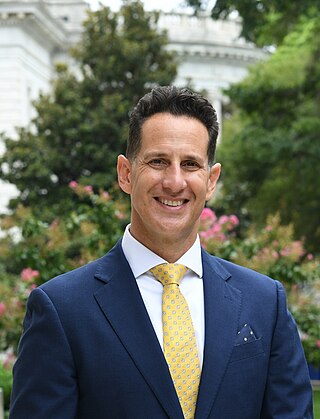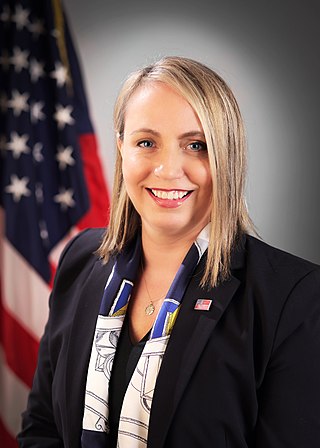Related Research Articles

The United States Government Accountability Office (GAO) is an independent, nonpartisan government agency within the legislative branch that provides auditing, evaluative, and investigative services for the United States Congress. It is the supreme audit institution of the federal government of the United States. It identifies its core "mission values" as: accountability, integrity, and reliability. It is also known as the "congressional watchdog". The agency is headed by the Comptroller General of the United States. The comptroller general is appointed by the president with the advice and consent of the Senate. When a vacancy occurs in the office of the comptroller general, Congress establishes a commission to recommend individuals to the president. The commission consists of the following:
In the United States, Office of Inspector General (OIG) is a generic term for the oversight division of a federal or state agency aimed at preventing inefficient or unlawful operations within their parent agency. Such offices are attached to many federal executive departments, independent federal agencies, as well as state and local governments. Each office includes an inspector general and employees charged with identifying, auditing, and investigating fraud, waste, abuse, embezzlement and mismanagement of any kind within the executive department.
The Permanent Subcommittee on Investigations (PSI), stood up in March 1941 as the "Truman Committee," is the oldest subcommittee of the United States Senate Committee on Homeland Security and Governmental Affairs. After the September 11, 2001, terrorist attacks in the United States, the Committee broadened its title to Homeland Security and Governmental Affairs Committee. PSI led the Committee's broad mandate to "investigate inefficiency, mismanagement, and corruption in Government."

The Public Company Accounting Oversight Board (PCAOB) is a nonprofit corporation created by the Sarbanes–Oxley Act of 2002 to oversee the audits of US-listed public companies. The PCAOB also oversees the audits of broker-dealers, including compliance reports filed pursuant to federal securities laws, to promote investor protection. All PCAOB rules and standards must be approved by the U.S. Securities and Exchange Commission (SEC).

The Office of Inspector General for the Department of State (OIG) is an independent office within the U.S. Department of State with a primary responsibility to prevent and detect waste, fraud, abuse, and mismanagement. OIG inspects more than 270 embassies, diplomatic posts, and international broadcasting installations throughout the world to determine whether policy goals are being achieved and whether the interests of the United States are being represented and advanced effectively.

The Department of Homeland Security Office of Inspector General was established along with the Department of Homeland Security itself in 2002 by the Homeland Security Act. Its website describes its mission as "supervis[ing] independent audits, investigations, and inspections of the programs and operations of DHS, and recommends ways for DHS to carry out its responsibilities in the most effective, efficient, and economical manner possible."

Linda M. Springer served as the eighth Director of the United States Office of Personnel Management. She was unanimously confirmed by the United States Senate in June 2005. Prior to her appointment, Ms. Springer served as controller and head of the Office of Federal Financial Management at the White House Office of Management and Budget. She previously worked for 25 years as an executive and actuary in the insurance and financial services industries.

The U.S.Department of Transportation Office of Inspector General is one of the Inspector General offices created by the Inspector General Act of 1978. The Inspector General for the Department of Transportation, like the Inspectors General of other federal departments and agencies, is charged with monitoring and auditing department programs to combat waste, fraud, and abuse.

The NASA Office of Inspector General is the inspector general office in the National Aeronautics and Space Administration, the space agency of the United States. The OIG's stated mission is to "prevent and detect crime, fraud, waste, abuse, and mismanagement and promote efficiency, effectiveness, and economy throughout NASA."

The federal government of the United States empowers a wide range of federal law enforcement agencies to maintain law and public order related to matters affecting the country as a whole.
United States Intelligence Community Oversight duties are shared by both the executive and legislative branches of the government. Oversight, in this case, is the supervision of intelligence agencies, and making them accountable for their actions. Generally oversight bodies look at the following general issues: following policymaker needs, the quality of analysis, operations, and legality of actions.
Genevievette Walker-Lightfoot is a former U.S. Securities and Exchange Commission (SEC) attorney. She worked on the Bernard Madoff investigation in 2004, as the Lead Investigator for the SEC on the case. She discovered key elements of the Madoff Ponzi scheme and reported them to her superiors. She was moved off the case prior to being able to complete the investigation.

The Department of Defense Office of Inspector General is an independent, objective agency that provides oversight related to the programs and operations of the United States Department of Defense (DoD). DoD IG was created in 1982 as an amendment to the Inspector General Act of 1978.

The Department of Defense Whistleblower Program in the United States is a whistleblower protection program within the U.S. Department of Defense (DoD), whereby, DoD personnel are trained on whistleblower rights. The Inspector General's commitment fulfills, in part, the federal mandate to protect whistleblowers. It also administers the Defense Intelligence Community Whistleblower Protection Program (DICWP), as a sub-mission for the intelligence community. The Inspector General's Defense Criminal Investigative Service also conducts criminal investigations which rely, in part, on Qui Tam relators.

The Office of Inspector General (OIG) for the United States Department of Health and Human Services (HHS) is responsible for oversight of the United States Department of Health and Human Service's approximately $2.4 trillion portfolio of programs. Approximately 1,650 auditors, investigators, and evaluators, supplemented by staff with expertise in law, technology, cybersecurity, data analytics, statistics, medicine, economics, health policy, and management and administration. Based on Federal Employee Viewpoint Survey scores, OIG has been ranked the best place to work in HHS for 5 consecutive years by the Partnership for Public Service.

Patrick P. O'Carroll Jr. was the third Inspector General for the Social Security Administration of the United States of America, serving from November 24, 2004, to May 31, 2016.

Mark Lee Greenblatt is an American attorney and government official currently serving as the Inspector General of the United States Department of the Interior. As the Department's 7th confirmed Inspector General, Mr. Greenblatt oversees a nationwide workforce of more than 270 investigators, auditors, evaluators, attorneys, and support staff whose mission is to detect and deter waste, fraud, abuse, and misconduct in DOI programs, and to promote economy and efficiency in Departmental operations. Mr. Greenblatt is the senior official responsible for providing oversight of more than 70,000 Department employees, assessing the Department's diverse programs with more than $10 billion in grants and contracts, and conducting complex administrative and criminal investigations.

The Office of the Metropolitan Transportation Authority Inspector General (OIG) is the Office of Inspector General specific to the Metropolitan Transportation Authority (MTA) that is responsible for conducting monitoring and oversight of MTA activities, programs, and employees.

Christi A. Grimm is an American government official who has served as the Inspector General in the United States Department of Health and Human Services since February 2022.

The U.S.Department of Education Office of Inspector General is an Inspector General office created by the Department of Education Organization Act. The Inspector General for the Department of Education is charged with investigating and auditing department programs to combat waste, fraud, and abuse.
References
- ↑ "Elizabeth A. Coleman". Federal Reserve. Retrieved 3 July 2009.
- ↑ "Financial Services Subcommittee on Oversight and Investigations". YouTube . Retrieved 5 May 2009.